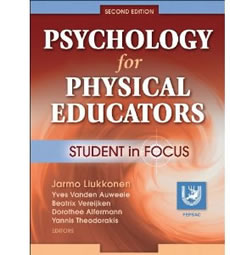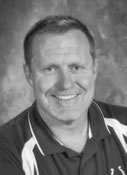MEDIA
REVIEW
media review written by Ted
Scheck
I'd venture to guess the authors of this book are not exactly
from around these here parts. If you guessed Sweden, Denmark,
Norway, or the European vicinity, you'd be right-on. If you
guessed Des Moines, and if I ever meet you, I'll buy you an
atlas.
 The
authors are indeed from Europe, which right now is #1 on "Places
to See Before I Die." I really want to visit Europe because
I took mini-mental vacations while I reviewed the book, learning
much from the Europeans regarding the field of sport psychology
and physical education. I learned many interesting, new, thought-provoking,
and even revolutionary things from this book, and it stirred
my normally whirlpool-like curiosity into a frothy frenzy.
It's no wonder: 29 different authors, representing seven European
countries contributed to the text. What they collectively
contributed is an absolutely amazing text. The
authors are indeed from Europe, which right now is #1 on "Places
to See Before I Die." I really want to visit Europe because
I took mini-mental vacations while I reviewed the book, learning
much from the Europeans regarding the field of sport psychology
and physical education. I learned many interesting, new, thought-provoking,
and even revolutionary things from this book, and it stirred
my normally whirlpool-like curiosity into a frothy frenzy.
It's no wonder: 29 different authors, representing seven European
countries contributed to the text. What they collectively
contributed is an absolutely amazing text.
Having reviewed the book, I feel that Europeans take P.E.,
the development of motor skills, health education, fitness,
and especially the development of children's life skills (self-perceptions
and socio-emotional skills) very seriously. From the Prologue:
"In all European school systems, the major goal of physical
education is to enhance physical activity." Sounds overly
simple, but it's the simple things in life that are often
most elegant, and uncomplicated, and easy to understand.
Fourteen chapters are split into four parts or Promotions:
Promotion of Lifelong Health and Fitness;
Promotion of Social Skills for Life; Self-Concept
and Cognitive Skills, and Motor Skills for
Life. Those 29 authors I mentioned? They’re
all made up from the European Federation of Sport Psychology
(FEPSAC) with a foundation of seven curricular foundational
posts set deeply and firmly in the soil of European Physical
Education: fitness, health, safety, psychomotor competence,
positive self-perception, and social development.
I have a student entering the 4th grade who has behavior
that I can only describe as puzzling. He is an impulsive,
rowdy little thing, impish in character yet at the same time
charming and overall a very interesting kid. This past spring
we were outside in the little woods attached to my school,
and I was timing them in running one lap on the trail, about
1/9 of a mile. I happened to glance through the trees and
saw him cheating, cutting across. That is the surface stuff
with this young man. I want to go deeper, down into the murky,
cold rock quarry waters of his psyche into the why.
What motivates him to cheat himself out of the full benefit
of a distance a lot of my students can cover in about a minute
twenty? Why cheat? And what is deeper down still, beneath
why?
I was amazed by what I read on page 4, the opening sentence
of Chapter 1: "Establishing a Positive Motivational Climate
in Physical Education." What I learned in this one little
paragraph changed the lenses through which I viewed everything
about what, how, and why I teach. It hit me beneath my own
why.
Let me explain. A "motivational climate"
is somewhat dryly defined as a 'situation-induced environment
directing the goals of an action in achievement situations.'
Situation-induced is my lesson plan, the equipment, the directions
I give the students, the way they interpret the lesson and
follow-through with their own interpretations, and then translate
the interpretations into movements. It is also my verbal and
non-verbal cues; tone of voice, body language, and even facial
expressions; how I treat each individual, and also how I treat
the class as a whole. There are two types of motivational
climates: task involving and ego
involving. Reading little sentence that I think I
could write an entire book about, the message made a HUGE
impact.
I'm sorry to say that for most of my teaching career I've
been an ego involving teacher. This has to do with how a teacher
views "success" and how that view is consciously
and unconsciously threaded into the teacher's presentation
of the lesson plan. and then those threads spun and manipulated
into the broad fabric of the lesson itself. My own sense of
style of teaching was nearly always 'ego involving' in that
it was highly competitive, mistakes were immediate grounds
for punishment, there was unequal recognition in that highly-skilled
athletes were favored over less-skilled, and there was always
a strong sense of intra-team rivalry.
Have you heard the aphorism "We teach like we're
taught?" It's true, for the most part. I unconsciously
modeled both the good and bad P.E. teachers of my formative
years.
Ego-involving climates are also highly prone to cheating,
since the 'winning isn't everything, it's the only thing.'
Lombardiesque mentality means bending or breaking
a few rules, which means a higher chance of winning over just
playing the game as good as you can and being a good sport.
Task involving climates are focused more on cooperative
learning, the student's role being important no matter how
talented or clumsy they are, and a strong focus on individual
improvement. A good illustration of task involving
and ego involving climates is the answer
to this question, asked by parents when their child gets home
from their game or contest: "How did you do?" or
"Did you win?"
Each question has embedded within it clues to the values
the individual holds dear about competition, and how competition
should be viewed, and the emphasis he or she places on the
importance of specific goals.
Mr. John Ballanger, my first Gym Teacher, was about the most
wonderful teacher I'd ever met besides my Dad, also a P.E.
Teacher. He was a task involving teacher, and praised
me for trying my best and smiling and being myself, as opposed
to the ogre I had to suffer through after Mr. Ballanger
left to join the National Guard in the early 1970s. Mr.
Ogre was definitely ego-involved, and praised the stars,
showed favoritism, and didn't hide his active dislike or even
outright contempt of me.
I'm sorry to say that I didn't turn into the amazing Mr.
Ballanger (not 100% of the time, anyway) or even a replica
of my father, whose name and legacy I share and who was a
world-class P.E. Teacher and Coach. Much of my early-career
teaching, I realize painfully, was like Mr. Ogre,
a man who once embarrassed me to the point of tears in the
5th grade by hitting me in the head with a dodgeball just
to get my wandering attention, and then allowing the entire
class to laugh at my expense. Reading this text made me evaluate,
and then reevaluate, much about the engine that drives my
teaching.
The task vs. ego revelation immediately
changed the way I taught; the entire flavor of my lesson plans;
the way I saw and perceived things. This book is for an old
dog learning a bag of new tricks. Life-changing. To say I'd
highly recommend it is like saying, after two days of crawling
over the blisteringly-hot sands of the Gobi Desert, that yes,
please, I’d like a sip of water if you don't mind.
If you teach under the umbrella of Wellness (Health, Recreation,
Physical Education, etc.) then get this book as soon as you
can, read it from cover to cover, and start on page 4. Get
ready to have your world quake, and the reset button on your
heart pressed hard by a big thumb.
 Biography: Biography:
Ted Scheck graduated from St. Ambrose College, located in
Davenport, Iowa, in 1985 with a BA in Physical Education,
and from 1985-89 he taught three years at Davenport Schools.
He moved to Indianapolis with his wife, Pam, in 1989 and taught
his first year at Indianapolis Public Schools. From 1990-2002
Ted worked as Director of Motion Analysis Laboratory at Riley
Hospital for Children. When the funding ran out for that job
he got back into teaching, and has been at various schools
in IPS since 2003.
Sidener Academy for High Ability Students opened in 2008
and Ted was chosen as the PE/Wellness teacher. Teaching has
been a long, and extremely interesting road for him, and at
the midpoint of his career he feels that the next 12 or 13
years should be the best of his career. He's looking forward
to it!
Ted is certified in Gifted Education from Ball St, University,
one of the few PE/Wellness teachers in Indiana to teach high-ability
students. PE is not covered by the definition of "gifted
& talented" so Mr. Scheck is working on creating
his own curriculum.
To Main MEDIA
Review Page
(back
to pelinks4u homepage) |





 Biography:
Biography: